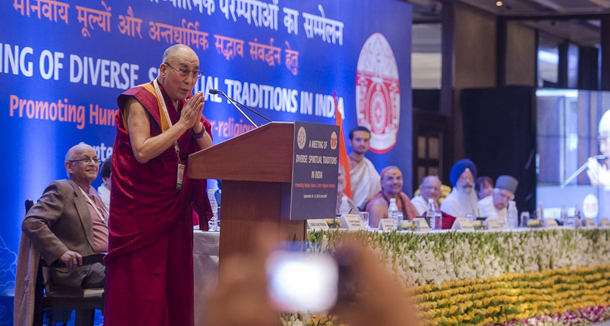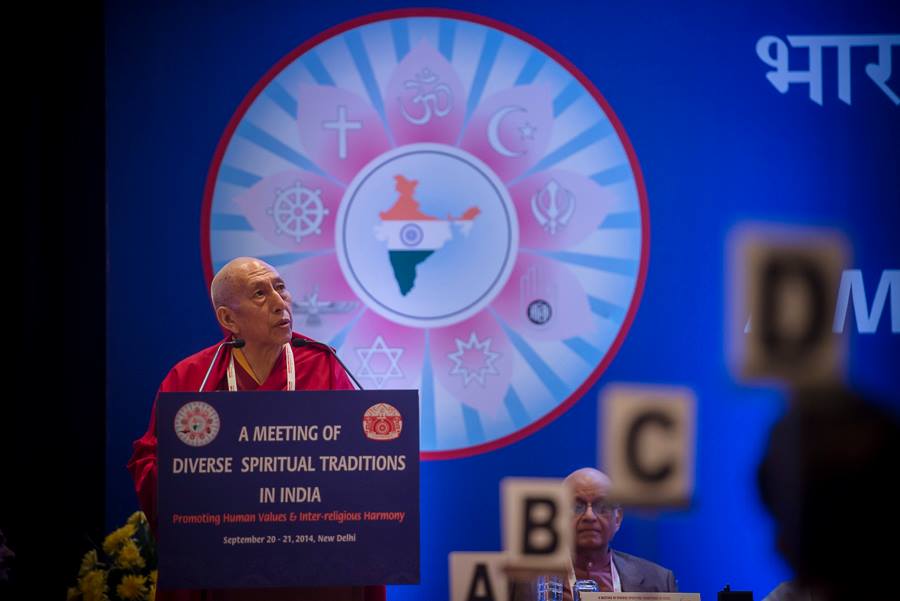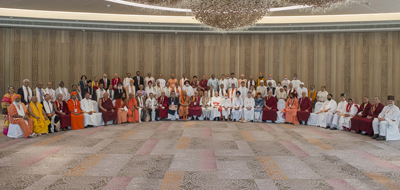
His Holiness the Dalai Lama delivering his opening remarks during the inaugural ceremony of ‘A Meeting of Diverse Spiritual Traditions in India’ in New Delhi, India
Photo/Tenzin Choejor/OHHDL
His Holiness the Dalai Lama has hosted a two-day meeting in celebration of spiritual and religious diversity and to promote harmony through dialogue. The “Meeting of Diverse Spiritual Traditions in India” took place in New Delhi on September 20 and 21. The conclave had been rescheduled to avoid clashing with Chinese President Xi Jinping’s visit to India from September 17 to 19, and was well attended by members of nine faiths.

Prof. Samdhong Rinpoche giving the welcome speech during the inaugural ceremony
Photo: facebook/Professor Samdhong Rinpoche
The Chairman of the Preparatory Committee, Prof Samdhong Rinpoche, the venerated spiritual leader and former head of the Tibetan Government-in-Exile, and a passionate and well-known advocate of non-violence, gave the welcome speech during the inaugural ceremony. Rinpoche spoke about how, despite the great progress being made in scientific and technological developments, the persistence of violence in the world and damage to the natural environment were among the reasons that prompted His Holiness to host this meeting. This was followed by a performance by members of the Tibetan Institute of Performing Arts (TIPA) and the reciting of prayers by representatives of nine faiths.
The keynote address by His Holiness the Dalai Lama followed. He emphasised the need for all spiritual leaders to come together to make the 21st century an age of peace, compassion and tranquillity and to look beyond the key element of divide, political conflict, violence and self-centred attitudes. “I don’t think of myself as a Tibetan, a Buddhist or as somebody special like His Holiness the Dalai Lama. All of us human beings are the same physically, mentally and emotionally. We all want to live a happy life and we have a right to do so. And yet many of the problems we face are our own creations. Why? Because we think only of ourselves and neglect others,” he said.
The first day saw a plenary session “Inter-religious Understanding and Human Values” and talks by Chief Guest Najeeb Jung, Karma Paljor, Pujya Swami Chidanand Saraswati, Paul Dhinakaran, Sheikhul Masheikh Dewan Syed Zainul Abedin Ali Khan and Lochen Rinpoche among others.
Day two began with the second plenary session “Environment, Education and Society”, where moderator Arun Kapur opened the discussion with the idea that we seem to live in competition with nature. Opinions on the same were offered by Dr Shayama Chona, Mahamadaleshwar Swami Kailashnand Brahmachari, Dr Bhalchandra Mungekar, Fr Dr MD Thomas and others. The third and final plenary session was dedicated to refining a report of the meeting and a proposed action plan.
The most effective outcome of this meeting was the declaration adopted by the participants to foster harmony and tolerance in society through inter-religious dialogue. It recognised India’s heritage of an ancient civilization, celebrating the diversity of various spiritual and religious traditions; that the values of altruism, self-discipline and compassion are common to all faiths and are the bedrock of the shared future of their diverse local communities; and that religious harmony is imperative for social and economic development.
The meeting came to an end with members of TIPA performing the song “Thank you India”, followed by the Indian National Anthem.





 Print
Print Email
Email